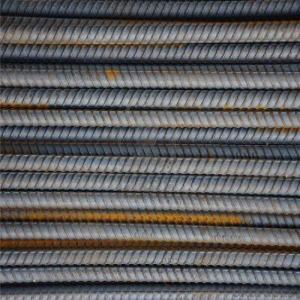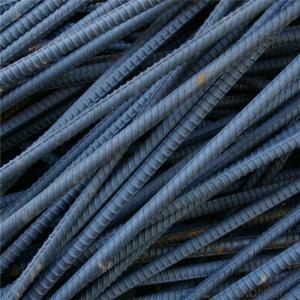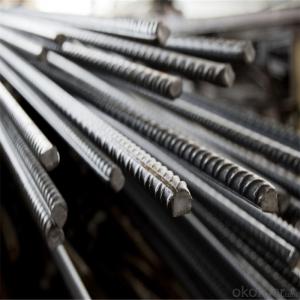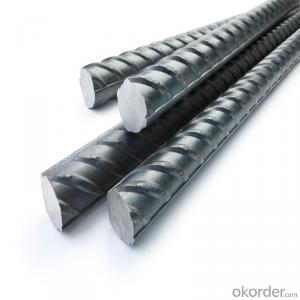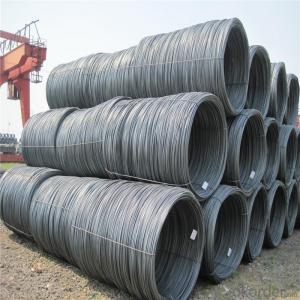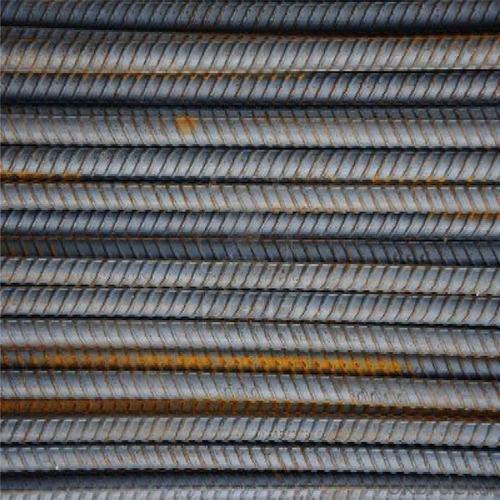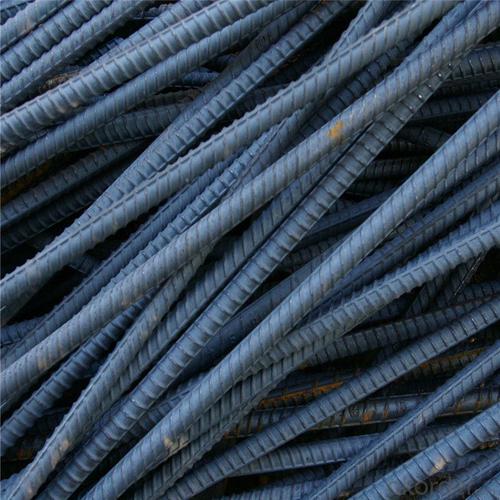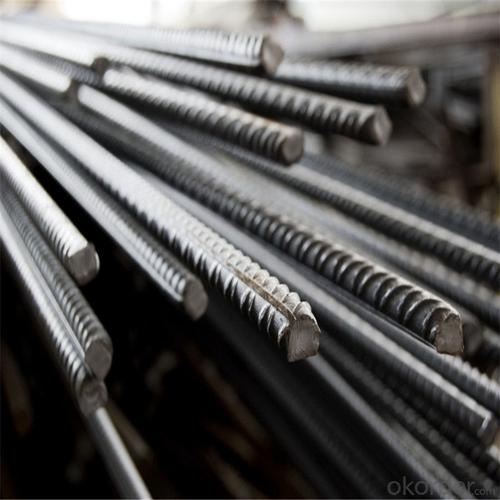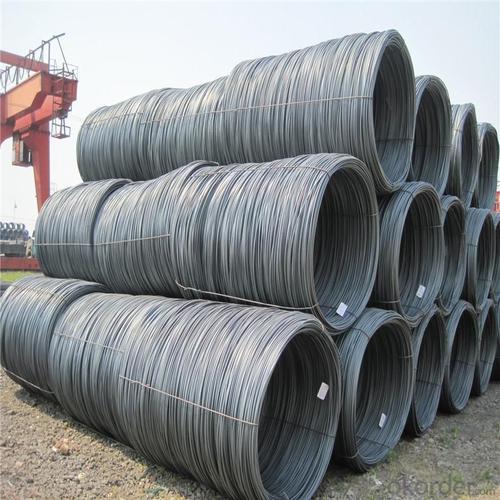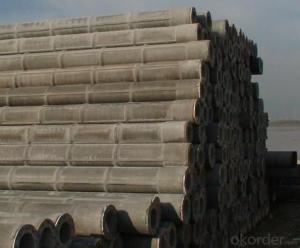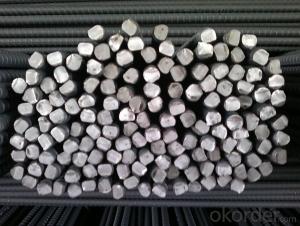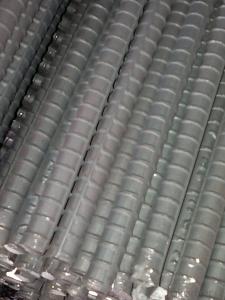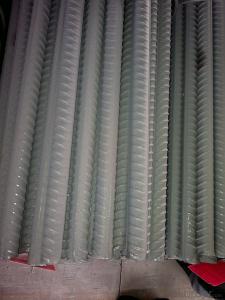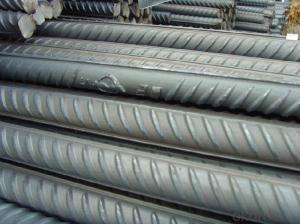Hot Rolled Galvanized Construction Deformed Twisted Steel Rebar
- Loading Port:
- Tianjin
- Payment Terms:
- TT OR LC
- Min Order Qty:
- 180 m.t.
- Supply Capability:
- 500000 m.t./month
OKorder Service Pledge
OKorder Financial Service
You Might Also Like
Specification
Hot Rolled Galvanized Construction Deformed Twisted Steel Rebar
Description of Hot Rolled Galvanized Construction Deformed Twisted Steel Rebar
1, Diameter: 5.5mm-10mm Reinforced Steel Bar Hrb400B
10m- 40mm Reinforced Steel Bar Hrb400B
2, Length: 6m, 9m, 12m or customized
3, Standard: GB, ASTM, AISI, SAE, DIN, JIS, EN
OEM technology - send detailed technical parameters for accurate quotation.
2, Produce Process: smelt iron - EAF smelt billet - ESR smelt billet -
hot rolled or forged to get the steel round bar and plate
3, Heat Treatment: annealing, normalizing, tempering, quenching
4, Surface Treatment: Black
5, Quality Assurance: We accept third party inspection for all orders.
You can ask testing organizations such as SGS, BV, etc. to test our products before shipping.
Chemical Composition of Hot Rolled Galvanized Construction Deformed Twisted Steel Rebar
Grade | Technical data of the original chemical composition(%) | |||||
Reinforcing steel bar HRB335 | C | Mn | Si | S | P | B |
≤0.25 | ≤1.60 | ≤0.80 | ≤0.045 | ≤0.045 | >0.0008 | |
Physics Capability | ||||||
Yield Strength(N/cm2) | Tensile Strength(N/cm2) | Elongation(%) | ||||
≥ 335 | ≥490 | ≥16 | ||||
Reinforcing steel bar HRB400 | C | Mn | Si | S | P | B |
≤0.25 | ≤0.16 | ≤0.80 | ≤0.045 | ≤0.045 | 0.04-0.12 | |
Physics Capability | ||||||
Yield Strength(N/cm2) | Tensile Strength(N/cm2) | Elongation(%) | ||||
≥ 400 | ≥ 570 | ≥ 14 | ||||
Products Show of Hot Rolled Galvanized Construction Deformed Twisted Steel Rebar
Company Information
CNBM International Corporation is the most important trading platform of CNBM group.
Whith its advantages, CNBM International are mainly concentrate on Cement, Glass, Iron and Steel, Ceramics industries and devotes herself for supplying high qulity series of refractories as well as technical consultancies and logistics solutions.


F A Q
1, Your advantages?
professional products inquiry, products knowledge train (for agents), smooth goods delivery, excellent customer solution proposale
2, Test & Certificate?
SGS test is available, customer inspection before shipping is welcome, third party inspection is no problem
3, Factory or Trading Company?
CNBM is a trading company but we have so many protocol factories and CNBM works as a trading department of these factories. Also CNBM is the holding company of many factories.
4, Payment Terms?
30% TT as deposit and 70% before delivery.
Irrevocable L/C at sight.
5, Trading Terms?
EXW, FOB, CIF, FFR, CNF
6, After-sale Service?
CNBM provides the services and support you need for every step of our cooperation. We're the business partner you can trust.
For any problem, please kindly contact us at any your convenient time.
We'll reply you in our first priority within 24 hours.
- Q: How is special steel used in the aerospace manufacturing process?
- Special steel is used in the aerospace manufacturing process due to its exceptional strength, durability, and resistance to extreme temperatures. It is utilized in various components such as turbine engines, landing gear, and structural parts, ensuring the safety and reliability of aircraft. Additionally, special steel alloys are employed in critical areas where weight reduction is necessary, enhancing fuel efficiency and overall performance.
- Q: How does special steel contribute to the transportation sector?
- The transportation sector relies heavily on special steel due to the numerous benefits it offers. Special steel plays a pivotal role in improving the efficiency, safety, and overall performance of vehicles. One primary advantage is its high strength-to-weight ratio, which allows manufacturers to reduce vehicle weight without compromising structural integrity. As a result, fuel efficiency improves, emissions decrease, and operating costs are lowered. Furthermore, special steel exhibits exceptional resistance to corrosion, making it especially advantageous in areas with severe weather conditions or exposure to saltwater, such as coastal regions or winter roadways where salt is used for ice melting. This corrosion resistance helps extend the lifespan of transportation infrastructure, such as bridges, tunnels, and railways, thus minimizing maintenance and replacement expenses. Another important aspect is the outstanding impact resistance of special steel. It can withstand heavy impacts and collisions, making it ideal for constructing vehicle frames, body panels, and safety components. This enhances passenger safety and reduces the likelihood of severe injuries during accidents. Special steel also plays a crucial role in producing high-performance engines and powertrains. Steel alloys with specific characteristics, such as high temperature and wear resistance, are utilized in manufacturing critical engine components like pistons, crankshafts, and camshafts. This ensures long-lasting and efficient engine performance, resulting in improved reliability and reduced downtime. Moreover, special steel contributes to advancements in electric and hybrid vehicles. Certain steel alloys possess unique properties that enable the development of lightweight battery packs, electric motor components, and charging infrastructure. These advancements facilitate the shift towards greener transportation options and help decrease the environmental impact of the sector. Overall, special steel has a profound influence on the transportation sector by providing lightweight, durable, corrosion-resistant, and impact-resistant materials. It not only enhances the performance and safety of vehicles but also contributes to the establishment of sustainable and efficient transportation systems.
- Q: What are the main applications of special steel in the automotive electrical systems?
- Special steel is commonly used in automotive electrical systems for various applications, including the production of electrical connectors, terminals, and other components. These materials offer excellent conductivity, corrosion resistance, and high temperature stability, ensuring reliable and efficient performance in demanding environments. Additionally, special steel can be used in the manufacturing of sensors, switches, and relays, providing durability, precision, and enhanced safety features in automotive electrical systems.
- Q: What are the properties of high-strength tool steel?
- High-strength tool steel possesses several key properties such as excellent hardness, exceptional wear resistance, high toughness, and good dimensional stability. It also exhibits high strength, good machinability, and the ability to withstand high temperatures, making it suitable for applications requiring heavy-duty cutting and shaping tools.
- Q: What are the applications of special steel?
- Special steel has a wide range of applications across various industries such as automotive, aerospace, construction, and manufacturing. It is used in the production of high-performance components and structures that require exceptional strength, durability, and resistance to heat, corrosion, and wear. Special steel finds applications in engine parts, aircraft components, cutting tools, molds, and high-rise buildings, among others.
- Q: How does special steel contribute to the power generation equipment industry?
- Special steel plays a crucial role in the power generation equipment industry by providing exceptional strength, durability, and corrosion resistance. It is extensively used in the manufacturing of turbines, generators, and other critical components, ensuring their reliable performance under extreme conditions. Special steel's high temperature and pressure resistance make it ideal for power plants, enabling efficient energy conversion and minimizing downtime. Additionally, its ability to withstand harsh environments and resist fatigue and wear extends the lifespan of power generation equipment, reducing maintenance costs and enhancing overall productivity in the industry.
- Q: How is special steel used in the telecommunications supply chain?
- Special steel is used in the telecommunications supply chain for various applications. It is commonly used in the manufacture of transmission towers, antenna masts, and other infrastructure components. The high strength and durability of special steel make it ideal for supporting heavy equipment and withstanding harsh environmental conditions. Additionally, special steel is also utilized in the production of fiber optic cables, providing protection and strength to ensure efficient data transmission. Overall, special steel plays a crucial role in ensuring the reliability and performance of telecommunications networks.
- Q: What are the requirements for special steel used in oil and gas equipment manufacturing?
- The requirements for special steel used in oil and gas equipment manufacturing are quite stringent due to the demanding operating conditions and harsh environments that these materials will be exposed to. Some of the key requirements include: 1. Corrosion Resistance: Special steel used in oil and gas equipment must have excellent resistance to corrosion, especially in the presence of various corrosive fluids such as oil, gas, and saltwater. This helps to prevent degradation and premature failure of the equipment. 2. High Strength: The steel must possess high strength and toughness to withstand the extreme pressures, temperatures, and mechanical stresses encountered in oil and gas operations. This ensures that the equipment can perform reliably under demanding conditions. 3. Heat Resistance: Oil and gas equipment often operates at elevated temperatures, especially in downstream processes such as refining and petrochemical applications. Special steel used in these applications must be able to maintain its mechanical properties and structural integrity even at high temperatures. 4. Weldability: Welding is a common joining technique used in the fabrication of oil and gas equipment. The special steel should have good weldability, allowing for efficient and reliable welding processes without compromising the overall strength and integrity of the equipment. 5. Fatigue Resistance: Oil and gas equipment is subjected to cyclic loading, which can lead to fatigue failure if the material is not properly designed to withstand these repetitive stresses. Special steel must possess good fatigue resistance properties to ensure long-term durability. 6. Low Temperature Properties: In certain applications, such as offshore drilling or arctic environments, the equipment may be exposed to extremely low temperatures. The special steel should exhibit excellent toughness and ductility at low temperatures to prevent brittle fracture. 7. Chemical Composition Control: The chemical composition of the special steel must be tightly controlled to ensure consistent and predictable material properties. This involves strict control over the levels of various alloying elements, impurities, and trace elements to meet the specific requirements of the oil and gas industry. Meeting these requirements is crucial for the safe and reliable operation of oil and gas equipment. Special steel manufacturers work closely with industry standards and specifications to develop and provide materials that meet these demanding requirements, ensuring the integrity and performance of the equipment in the oil and gas sector.
- Q: How does special steel contribute to the mining machinery industry?
- Special steel plays a crucial role in the mining machinery industry by offering exceptional strength, durability, and resistance to wear and corrosion. This type of steel is specifically engineered to withstand the harsh and demanding conditions that are typically encountered in mining operations. In the mining machinery industry, equipment such as drills, excavators, loaders, crushers, and conveyor systems are subjected to extreme stress, heavy loads, and abrasive materials. Special steel components can be found in various parts of these machines, including buckets, tracks, cutting edges, gears, and hydraulic components. The high strength and toughness of special steel ensure that mining machinery can withstand the immense forces and impacts involved in excavation, hauling, and processing of minerals. This durability helps to extend the lifespan of the equipment, reducing the need for frequent replacements and minimizing downtime, which ultimately leads to cost savings for mining companies. Moreover, special steel's resistance to wear and corrosion is vital in the mining industry. The presence of abrasive materials and corrosive substances in the mining environment can lead to rapid deterioration of machinery components. However, special steel alloys are designed to resist wear and corrosion, thereby enhancing the longevity and performance of mining machinery. Additionally, special steel enables mining machinery to operate efficiently and effectively. Its high strength-to-weight ratio allows for the construction of lightweight yet robust equipment, improving mobility and productivity in mining operations. The use of special steel also enables the design of complex components with intricate shapes, ensuring optimal functionality and performance. Overall, special steel is an indispensable material in the mining machinery industry. Its exceptional strength, durability, resistance to wear and corrosion, and ability to enhance efficiency make it a vital component in the design and construction of mining equipment. By incorporating special steel, mining machinery can withstand the harsh conditions and heavy-duty tasks involved in mining operations, ultimately contributing to increased productivity, reduced costs, and improved safety in the industry.
- Q: What are the requirements for special steel used in defense equipment manufacturing?
- The requirements for special steel used in defense equipment manufacturing typically include high strength and durability, resistance to corrosion and wear, good toughness and impact resistance, as well as the ability to withstand extreme temperatures and harsh environments. Additionally, the steel must meet stringent quality control standards and industry specifications to ensure its reliability and performance in critical defense applications.
Send your message to us
Hot Rolled Galvanized Construction Deformed Twisted Steel Rebar
- Loading Port:
- Tianjin
- Payment Terms:
- TT OR LC
- Min Order Qty:
- 180 m.t.
- Supply Capability:
- 500000 m.t./month
OKorder Service Pledge
OKorder Financial Service
Similar products
Hot products
Hot Searches
Related keywords
